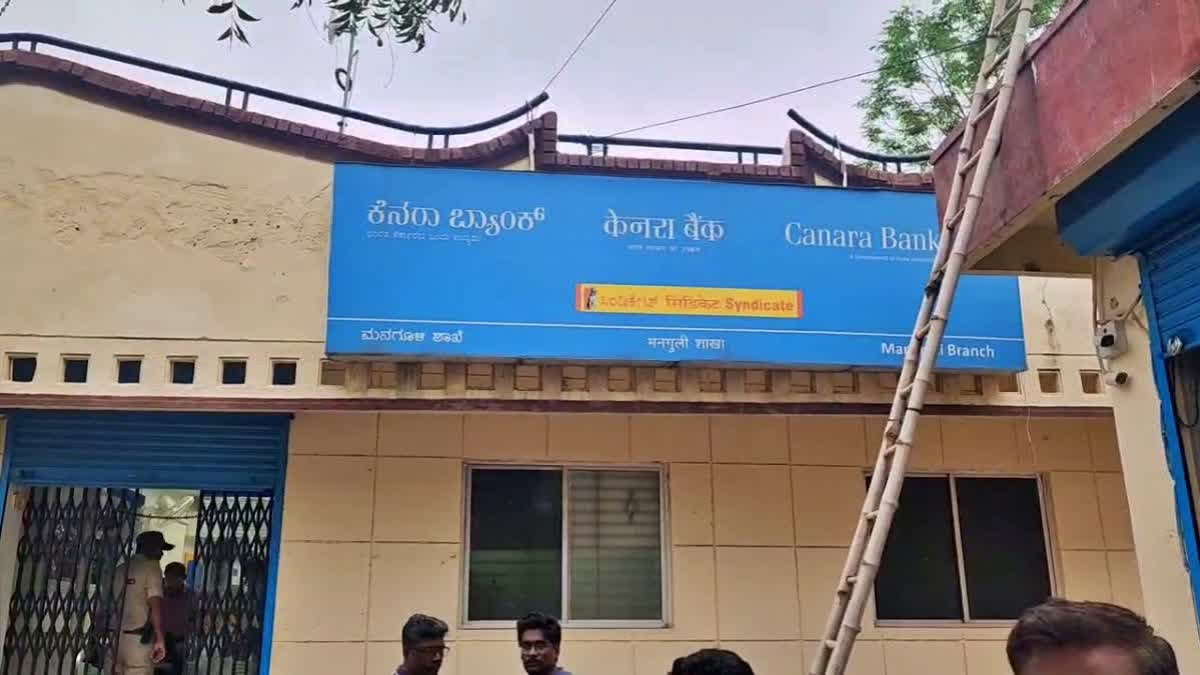In a dramatic turn of events that has sent shockwaves through Karnataka’s financial and law enforcement circles, a bank manager and two accomplices have been arrested for their alleged involvement in a daring heist exceeding Rs 53 crore. The incident, which unfolded in a prominent branch in Bengaluru, has exposed glaring lapses in internal security and raised pressing questions about the safety of public funds in the state’s banking sector. As investigators unravel the layers of this high-profile crime, the story has gripped the public’s attention and sparked widespread debate about trust, accountability, and the evolving face of financial fraud in India.
The reverberations of the Rs 53 crore heist have not only unsettled the banking sector but also prompted a wider conversation about the evolving nature of white-collar crime in India. Experts point out that as financial institutions adopt newer technologies and expand their digital footprints, the sophistication of criminal schemes has also increased. The Karnataka case stands as a stark example of how insider access, combined with technical know-how and external collusion, can bypass even established security protocols. This has led to renewed emphasis on the need for continuous monitoring, regular system audits, and the adoption of cutting-edge fraud detection systems that can identify irregular patterns in real time.
The psychological impact on the bank’s clientele has been profound. Many customers, especially senior citizens and small business owners, have expressed anxiety about the safety of their deposits, leading to a temporary surge in withdrawals and inquiries. The bank has responded by setting up dedicated helpdesks and communication channels to reassure customers, promising full transparency and swift compensation for any losses. Financial counselors have also been deployed to educate customers about digital safety and how to spot potential red flags in their accounts, aiming to restore confidence in the institution’s reliability.
Internally, the bank is undergoing a period of intense introspection and reform. Senior management has initiated a comprehensive review of hiring practices, employee training, and internal reporting mechanisms. There is a growing consensus that fostering a culture of ethical responsibility and open communication is as vital as technological safeguards. Whistleblower protection policies are being strengthened to encourage staff to report suspicious activity without fear of retaliation, and regular workshops on ethical conduct are being made mandatory for all employees.

1. Karnataka Bank Manager, Two Others Held for Over Rs 53 Crore Heist: How the Crime Unfolded
The sensational heist came to light earlier this week when senior officials at the Bengaluru branch discovered a massive shortfall in the bank’s vault during a routine audit. Initial confusion quickly gave way to alarm as the missing amount—over Rs 53 crore—was confirmed. A swift internal inquiry revealed that the branch manager, identified as Ramesh Kumar, had been acting in concert with two other individuals, both of whom were not bank employees but had developed close ties with the manager over the past year.
According to preliminary investigations, the trio meticulously planned the heist over several months. Exploiting his position of trust, Ramesh Kumar manipulated internal records, bypassed security protocols, and orchestrated a series of unauthorized fund transfers and cash withdrawals. The two accomplices, believed to be local businessmen with prior criminal records, helped launder the stolen funds through a network of shell companies and fraudulent accounts. The operation was executed in phases to avoid detection, but a surge in suspicious transactions eventually triggered red flags in the bank’s central monitoring system.
2. Karnataka Bank Manager, Two Others Held for Over Rs 53 Crore Heist: The Investigation and Arrest
Once the shortfall was detected, the bank’s headquarters immediately alerted the Karnataka police and the state’s Economic Offences Wing (EOW). A special investigation team was formed, comprising senior officers from the crime branch, cyber cell, and forensic accounting units. Through a combination of digital forensics, surveillance footage analysis, and interrogation of staff, investigators quickly zeroed in on the manager and his two associates.
The breakthrough came when police traced a series of large cash deposits and withdrawals to accounts linked to the accomplices. Acting on this intelligence, officers conducted simultaneous raids at multiple locations in Bengaluru and neighboring districts. Ramesh Kumar was apprehended at his residence, while the other two suspects were arrested while attempting to leave the city. During the raids, authorities recovered a significant portion of the stolen cash, luxury vehicles, gold jewelry, and documents related to the laundering operation.
3. Karnataka Bank Manager, Two Others Held for Over Rs 53 Crore Heist: Motive, Modus Operandi, and Security Lapses
Interrogation of the suspects has revealed a complex web of motives and methods. Ramesh Kumar, a veteran banker with over 15 years of experience, reportedly faced mounting personal debts and was lured by the prospect of a quick windfall. His accomplices, well-versed in financial fraud, provided the expertise needed to set up dummy companies and launder the proceeds. The trio exploited loopholes in the bank’s internal controls, including weak password management, lack of dual authorization for large transactions, and inadequate surveillance of high-value accounts.
The case has exposed significant vulnerabilities in the bank’s security infrastructure. Investigators found that routine audits were often superficial, and there was insufficient oversight of branch-level operations. The incident has prompted calls for a comprehensive review of security protocols, staff vetting processes, and the adoption of advanced fraud detection technologies across the banking sector.
4. Karnataka Bank Manager, Two Others Held for Over Rs 53 Crore Heist: Fallout and Public Reaction
The heist has sparked outrage among customers, stakeholders, and the general public, many of whom are demanding swift action and greater accountability from the bank’s management. The incident has also triggered panic among depositors, with some rushing to withdraw funds or seek reassurances about the safety of their savings. Banking associations and regulatory authorities have urged calm, emphasizing that the bank’s overall financial position remains stable and that all affected customers will be fully compensated.
In response to the crisis, the bank has suspended several employees pending further investigation and has pledged to overhaul its security and compliance systems. The Reserve Bank of India (RBI) has dispatched a team of auditors to conduct an independent review of the branch’s operations and recommend systemic improvements. Meanwhile, law enforcement agencies are expanding their probe to determine whether similar frauds have occurred in other branches or institutions.

Broader Implications for India’s Banking Sector
The Rs 53 crore heist in Karnataka is being viewed as a wake-up call for banks across the country. Financial experts warn that as banking operations become increasingly digitized, the risk of insider fraud and cybercrime grows. The incident has renewed calls for banks to invest in advanced security systems, including biometric authentication, AI-driven fraud detection, and regular staff training on compliance and ethics.
Banking unions are also demanding better protection for whistleblowers and stricter background checks for employees in sensitive positions. The case has highlighted the need for a culture of transparency and accountability, where irregularities are promptly reported and investigated without fear of reprisal.
The Human Angle: Impact on Employees and Customers
For many bank employees, the incident has been a sobering reminder of the importance of vigilance and ethical conduct. Some staff members have expressed shock and disappointment that a trusted colleague could orchestrate such a crime. The bank is providing counseling and support services for affected employees, while also reiterating its commitment to upholding the highest standards of integrity.
Customers, meanwhile, are grappling with anxiety and uncertainty. Many have praised the swift action taken by law enforcement and the bank’s management, but concerns remain about the adequacy of safeguards and the potential for similar incidents in the future. Financial literacy campaigns and customer awareness programs are being ramped up to help depositors recognize and report suspicious activity.
Legal Proceedings and the Path Forward
The arrested individuals have been remanded to police custody and are facing charges under multiple sections of the Indian Penal Code, including criminal breach of trust, fraud, and conspiracy. Investigators are working to trace the remaining stolen funds and identify any additional accomplices or beneficiaries. Legal experts predict a lengthy trial, with the possibility of further revelations as the case unfolds.
Regulators are closely monitoring the situation, with the RBI expected to issue new guidelines on internal controls and risk management in the coming months. The incident is likely to influence future policy decisions on banking supervision, cyber security, and the use of technology to prevent insider threats.

Conclusion: Lessons from the Karnataka Rs 53 Crore Bank Heist
The arrest of the Karnataka bank manager and his accomplices in the Rs 53 crore heist marks a pivotal moment for the state’s banking sector. As the investigation continues and reforms are implemented, the hope is that lessons learned from this incident will lead to stronger safeguards, greater transparency, and restored public trust. The case serves as a stark reminder that in an era of rapid technological change, vigilance, accountability, and ethical conduct are more critical than ever for the safety and stability of India’s financial system.
Law enforcement agencies, buoyed by the swift arrests and asset recoveries in this case, are now collaborating with banks across Karnataka to conduct risk assessments and share intelligence on emerging threats. Joint task forces are being considered to monitor high-value transactions and suspicious account activities, while cybercrime units are being equipped with advanced analytical tools. The hope is that a proactive, coordinated approach will not only deter future heists but also ensure rapid response in the event of a breach.
As the legal proceedings move forward, the Karnataka heist is expected to become a landmark case in the annals of Indian banking history. The lessons drawn from this incident are likely to influence regulatory frameworks, operational protocols, and public attitudes toward financial security for years to come. Ultimately, the case serves as a powerful reminder that trust, once broken, is hard to rebuild—but with transparency, vigilance, and collective effort, the integrity of the financial system can be restored and even strengthened in the aftermath of adversity.

